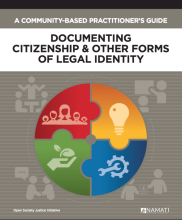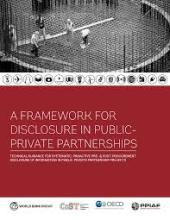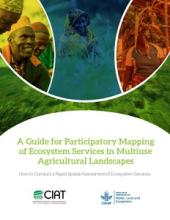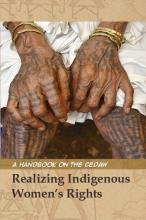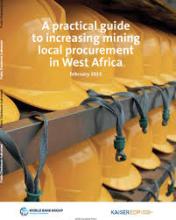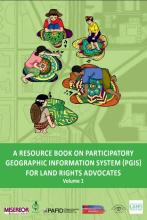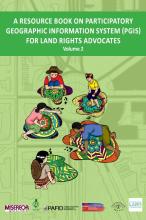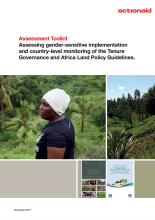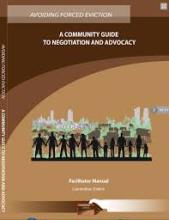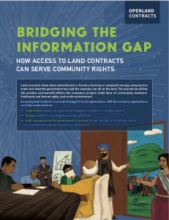Resources for Civil society
A Community-Based Practitioner’s Guide: Documenting Citizenship and Other Forms of Legal Identity
This guide provides step-by-step instructions on establishing and operating a paralegal or other community-based program to help people obtain legal identity documents. It is primarily for people designing and managing community-based paralegal projects to help clients access documentary proof of citizenship and other forms of proof of legal identity, such as birth certificates. However, it will also be useful to those undertaking legal aid, litigation, and non-litigation advocacy work, as the issues that it seeks to address frequently lie at the intersection of laws and how they are applied in practice.
A Framework for Disclosure in Public-Private Partnership Projects
This framework provides guidance on policy and practice in public-private partnerships and on the mechanics of disclosure by practitioners within governments and the private sector, to help develop programmes for the systematic, proactive pre- and post- procurement disclosure of information.
A Guide for participatory mapping of ecosystem services in multiuse agricultural landscapes: How to conduct a rapid spatial assessment of ecosystem services
This guide presents a step-by-step approach in using a participatory mapping method with community members to identify and map ecosystem services and changes in their supply across multiuse agricultural landscapes. Non-governmental organizations (NGOs), government agencies and researchers can use this approach to learn from communities about how they use and access natural resources. This activity uses a landscape approach to help land management practitioners understand the ways in which people depend on and access ecosystem services and how changes in their availability impact livelihoods across the landscape.
A Handbook on the CEDAW: Realizing Indigenous Women's Rights
This handbook is an introduction to the human rights of indigenous women. It provides some detail on the CEDAW as the only instrument specifically for women. It also provides a brief overview of the other available human rights mechanisms.
A practical guide to increasing mining local procurement in West Africa
This document provides information, guidance and tools to support decision-making, planning and implementation of mining local procurement, in particular at a country level. It can be used by individual role players as well as form the basis of consultative processes. The guide can also support regional harmonization relating to mining local procurement. Although based on West Africa, it will be a useful resource in other regions.
A Resource Book on Participatory Geographic Information System (PGIS) for Land Rights Advocates (Volume 1)
This guide (volume 1) aims to equip land rights advocates, development practitioners and stallholder farmers and indigenous people’s communities with the necessary knowledge, attitude, and skills on Community Mapping and Participatory Geographic Information System (PGIS). It focuses on data collection, database management, data processing, and analysis for the production of digital maps useful in advancing the land rights agenda of rural communities, particularly indigenous communities and smallholder farmers in Southeast Asia. Thisfirst volume is designed to impart the key concepts of community mapping and the basics of participatory GIS (PGIS), with the view that the application of PGIS technology contributes to (1) securing legal recognition of the indigenous communities over their traditional territories and resources, and (2) for smallholder farmers and landless rural poor to defend their rights to land and the sustainable use of natural resources.
A Resource Book on Participatory Geographic Information System (PGIS) for Land Rights Advocates (Volume 2)
This guide (volume 2) aims to equip land rights advocates, development practitioners and stallholder farmers and indigenous people’s communities with the necessary knowledge, attitude, and skills on Community Mapping and Participatory Geographic Information System (PGIS). It focuses on data collection, database management, data processing, and analysis for the production of digital maps useful in advancing the land rights agenda of rural communities, particularly indigenous communities and smallholder farmers in Southeast Asia. This second volume is designed to impart on the “how-tos” for the production of digital maps useful in advancing the land rights agenda of rural communities, particularly indigenous communities and smallholder farmers in Southeast Asia.
Assessment Toolkit: Assessing gender-sensitive implementation and country-level monitoring of the Tenure Governance and Africa Land Policy Guidelines
This gender-sensitive toolkit enables civil society organisations, women and communities, as well as other actors to assess each country’s current legal framework and tenure governance arrangements in line with the provisions of the VGGTS and the AU F&G.
Avoiding Forced Evictions: A Community Guide to Negotiation and Advocacy: Participant’s Manual
This guide aims to help communities who face, or have suffered from, evictions by providing guidance on how to prepare for negotiations. Communities can use this guide to negotiate and advocate for solutions or alternatives to eviction that improve the lives of the whole community.
This resource is part of the CCSI’s Directory of Community Guidance on Agreements Relating to Agriculture or Forestry Investment.
Briefing for Grassroots Organizations – Bridging the Information Gap: How Access to Land Contracts Can Serve Community Rights
This note provides guidance for civil society actors and communities on how to access and how to use the information contained in contracts with companies to be able to:
• Understand company and government obligations related to a company project;
• Monitor whether those obligations are being fulfilled;
• Hold companies and the government to account for bad contracts or for failing to deliver on commitments that are important to communities.


